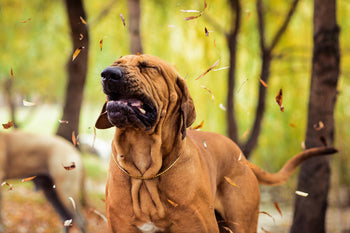Achoo! Understanding and Addressing Your Sneezing Dog.

As a devoted dog owner, it's natural to be concerned when your furry friend starts sneezing more frequently than usual. While sneezing is a common bodily response, excessive or persistent sneezing in dogs could indicate underlying issues that require your attention. Here, we'll explore the reasons behind your dog's sneezing, when it's a cause for concern, and what steps you can take to help your canine companion find relief.
Normal vs. Excessive Sneezing:
Just like humans, dogs sneeze to clear irritants from their nasal passages. Occasional sneezing is normal, especially if your dog has encountered dust, pollen, or other environmental triggers. However, if your dog is sneezing repeatedly or intensely, it's important to investigate further to determine if there's an underlying problem.
Potential Causes of Excessive Sneezing:
Allergies: Dogs can be allergic to various environmental factors, such as pollen, dust mites, Mold, or certain foods. Allergies can trigger sneezing as the body tries to expel the allergens.
Foreign Objects: Dogs are curious creatures and might inhale small foreign objects like grass, dust, or even a tiny piece of a plant. These objects can irritate the nasal passages and lead to constant sneezing.
Infections: Respiratory infections caused by viruses or bacteria can lead to sneezing, nasal discharge, coughing, and other symptoms.
Nasal Irritants: Strong odours, smoke, cleaning products, or perfumes can irritate a dog's sensitive nasal passages and prompt sneezing.
Dental Issues: Dental problems, such as infected teeth or gum disease, can cause sneezing if the infection spreads to the nasal passages.
Nasal Tumours: Though less common, nasal tumours can cause chronic sneezing and nasal discharge. It's more likely in older dogs.
Signs That Require Attention:
While the occasional sneeze might not be cause for alarm, there are signs that should prompt you to take action:
Frequent or Persistent Sneezing: If your dog is sneezing frequently over a period of time, it's worth investigating the cause.
Nasal Discharge: Clear, yellow, green, or bloody discharge from the nose can indicate infection or irritation.
Nasal Bleeding: If your dog's sneezing is accompanied by nosebleeds, seek veterinary care immediately.
Changes in Behaviour: If your dog seems lethargic, has a reduced appetite, or exhibits other behavioural changes, it might be related to the sneezing.
Steps to Address Excessive Sneezing:
Consult Your Veterinarian: If you're concerned about your dog's persistent sneezing, consult your veterinarian. They can perform a thorough examination and determine the underlying cause.
Treatment Plan: Depending on the diagnosis, your vet might recommend various treatments:
Allergy Management: If allergies are suspected, your vet might suggest antihistamines, environmental changes, or dietary adjustments.
Medications: Antibiotics or antiviral medications can be prescribed for infections.
Removal of Foreign Objects: If an object is causing irritation, your vet may need to remove it under anaesthesia.
Tumour Evaluation: If a tumour is suspected, your vet may recommend further tests, such as X-rays or biopsies.
Avoid Sneezing Issues at Home:
Avoid Irritants: Minimize exposure to irritants like smoke, strong odours, or cleaning products.
Maintain Dental Health: Regular dental care can prevent infections that might spread to the nasal passages.
Maintain a Clean Environment: Keep your home free of dust, pollen, and other potential allergens that could trigger sneezing. Air filters can help keep pollens and dust down in the air.
Provide Comfort: Ensure your dog has a comfortable and quiet space to rest if they're not feeling well.
When to Seek Urgent Veterinary Care:
Certain signs indicate the need for immediate veterinary attention:
Severe Bleeding: If your dog's sneezing is accompanied by severe or persistent nosebleeds, seek emergency care.
Laboured Breathing: Difficulty breathing, wheezing, or open-mouth breathing are serious signs that warrant urgent attention.
Head Tilt or Swelling: If your dog's head is tilted to one side or they have facial swelling, this could indicate a serious issue.
A sneezing dog might appear cute, but excessive or persistent sneezing should never be ignored. By understanding the potential causes of your dog's sneezing and being vigilant for concerning signs, you can take the necessary steps to ensure your furry friend's health and comfort. If you're ever in doubt or notice worrisome symptoms, don't hesitate to consult your veterinarian. Remember, they are your partner in providing the best possible care for your beloved canine companion.








